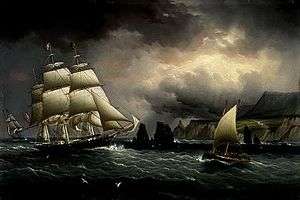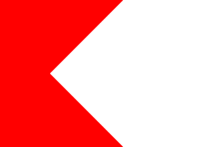Grinnell, Minturn & Co
Grinnell, Minturn & Co. was one of the leading transatlantic shipping companies in the middle 19th century. It is probably best known today as being the owner and operator of the Flying Cloud, arguably the greatest of the clipper ships.

History
The company was founded ca. 1815 as Fish, Grinnell & Co. (the senior partner of which had the memorable, if improbable, name of Preserved Fish (1766–1846)); the Grinnell was Joseph Grinnell, one of six sons of a shipper and merchant in New Bedford, Massachusetts. Joseph Grinnell's two younger brothers, Henry (1800–1874) and Moses (1803–1877), became members of the firm in 1825, and in 1828 Joseph retired. In ca. 1830, Robert Bowne Minturn (1805–1866), a member of a family long prominent in New England and New York shipping circles, joined the firm (his sister Sarah had married Henry Grinnell in 1822) and it became Grinnell, Minturn & Co., or simply Grinnell & Minturn. The company stayed "in the family" and remained active until 1880.[1][2]
Blue Swallowtail Line
The company's first major endeavor was its Liverpool Line, known as the Blue Swallowtail Line (1822–1880) from its distinctive blue and white swallowtailed house flag. This enterprise was originally started by Fish, Grinnell and Co. in cooperation with Thaddeus Phelps and was called the "Fourth Line of Liverpool Packets." The Blue Swallowtail line originally sailed monthly and, like the other Liverpool-New York packet lines, did a thriving business in the wave of Irish immigration in the wake of the potato famine.[3] Its ships included the New World (built 1846, and reported to be the largest merchant ship in the world at the time),[4] Queen of the West, Henry Clay, Ashburton, Patrick Henry, Roscoe, American Union, and Albert Gallatin.
Red Swallowtail Line

The company entered the New York-London market a year later with its London (Red Swallowtail) Line, which also endured until 1880. The flag was the same as for the Liverpool line, but with red at the hoist instead of blue. The ships included the Columbia, Sir Robert Peel (built 1846), Patrick Henry (after her 1852 transfer from the Blue Swallowtail line), Prince Albert, Yorktown (1847), London (1848), and Rhine. Many of these ships were actually owned by the partners (in shares) individually, and not owned by the company itself.
As its business grew, the company's reputation expanded, even to Canada. In 1835, the Quebec Mercury commented on "[T]he exertions of Messrs. Grinnell, Minturn & Co. . . . to increase the efficiency of the London line" and called for "every encouragement on the part of those of our community who are in the habit of frequently crossing the Atlantic."[5]
California Line
Later, when the discovery of gold in the Sierra Nevada made California a popular destination for travelers from the East Coast, the company founded a California Line of clippers. The demands of the voyage were such that larger ships were required, and the Flying Cloud (built 1851) was purchased for this route for the phenomenal sum of $90,000 before the ship was even launched.[6] The ship set a record for the New York-to-San Francisco run around Cape Horn in 1851 (despite losing a portion of a mast en route), and improved on its own mark in 1853, setting a record for ships under sail that lasted for over 100 years. The Flying Cloud, like many of the line's ships, had individual ownership. Moses H. Grinnell and Robert Minturn each held 9/32 shares. Henry Grinnell, John E. Williams, and Francis S. Hathaway each held 4/32 shares. Captain Creesy held 2/32 shares.[7]
Additional significance
Because of its extensive shipping operations, the company (and the Minturn family) was involved in a number of landmark legal cases having to do with ships and shipping, including Minturn v. United States[8] and Lawrence v. Minturn.[9] Another of these cases described the company as "Grinnell, Minturn & Co., large shipping merchants of New York".[10]
Miscellaneous information
The first name of Preserved Fish was properly pronounced with three syllables, and was a reference to being "preserved from sin" or "preserved in grace"; his family, prominent in New York, also gave rise to Hamilton Fish, governor, senator, and secretary of state.
Robert B. Minturn is an ancestor of Edie Sedgwick.
Robert B. Minturn, Jr. (born 21 February 1836) was also vice president of the railroad that founded the town of Minturn, Colorado, giving his name to that town.
References
- ↑ Joe McMillan, House Flags of U.S. Shipping Companies: G Flags Of The World; accessed 2015.06.17.
- ↑ Larry Grinnell, Grinnell Flying Cloud, 30 April 2011; accessed 2015.06.17.
- ↑ See Thomas Carolan, An Irish Passenger, An American Family, And Their Time" and related pages.
- ↑ Donald Gunn Ross, III, "Building and launching the New World".
- ↑ "Ship Arrivals at the Ports of Montreal and Quebec, 1835", Quebec Mercury #87, Tuesday, July 28, 1835. Reprinted here.
- ↑ Flying Cloud
- ↑ First Voyage of the Flying Cloud
- ↑ 106 U.S. 437, 27 L.Ed. 208, 1 S.Ct. 402 (1882).
- ↑ 58 U.S. (17 How.) 100 (1855).
- ↑ Ins. Co. v. Wright, 68 U.S. 456, 17 L. Ed. 505 (1864).
Bibliography
- Ross, Donald Gunn III. "Building and launching The New World". The Era of the Clipper Ships. Retrieved September 3, 2011.
- Ross, Donald Gunn III. "Era of the Clipper Ships Web Site". Archived from the original on March 30, 2010. Retrieved September 3, 2011.